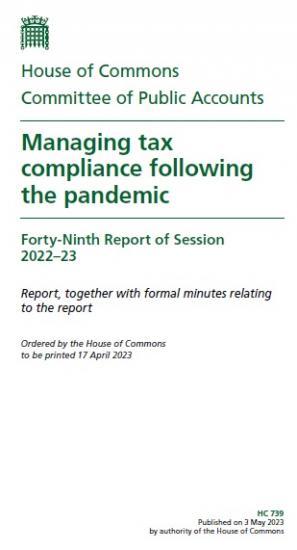HMRC Collected £9billion Less Tax During The Pandemic
3rd May 2023

A report by the Public Accounts committee of the UK government shows the reduced amount of taxes collected during over the two years (2020-21 and 2021-22). 4000 staff were moved from compliance work to help deal with other work related to the pandemic. Taxes are not necessarily lost but will take longer to collect
In response to the immediate needs of the COVID-19 pandemic, HM Revenue & Customs (HMRC) quickly made changes needed to reprioritise its work and staffing, initially redeploying more than four thousand experienced compliance staff to its new COVID support schemes. These changes resulted in less capacity to check whether people and businesses are complying with tax rules. HMRC opened fewer tax enquiries and prosecuted far fewer people for tax evasion during the pandemic. Tax revenue directly attributable to HMRC compliance work (compliance yield) fell as a proportion of tax revenue from an average of 5.2% before the pandemic to 4.2% in 2021-22, the lowest level since 2011-12. This equated to £9 billion less yield over the two years (2020-21 and 2021–22) compared with its performance before the pandemic. HMRC's compliance staff were also less productive due to social distancing restrictions and the loss of more experienced staff. On average, those still working on tax compliance generated £1.1 million of compliance yield a year per staff member, compared with £1.3m before the pandemic.
HMRC does not yet have a full understanding of how the pandemic and its response to it have affected levels of non-compliance. There is a risk that fewer compliance investigations and prosecutions, which HMRC does not expect to return to pre-pandemic levels, will weaken the deterrent effect of HMRC's work. It seems likely that many more non-compliant taxpayers will now escape paying their fair share of tax potentially undermining the sense of fairness on which the tax system relies.
The disruptions caused by the pandemic and the cost of living crisis mean the tax gap is highly uncertain and it is concerning that levels of non-payment are rising. With HMRC under increasing pressure, we are disappointed that it could not say what level of compliance yield it could routinely generate with the resources it has. This makes it hard to have confidence that HMRC will live up to its claim that no tax will go uncollected as a result of the pandemic. HMRC should have a clear plan and trajectory to catch up on compliance activity and prosecutions not carried out during the pandemic. HMRC must also show how it will support the growing number of taxpayers who want to pay their tax but also need its help, ensuring that it is never easier for people to cheat the tax system than to comply with it.
Read the full report HERE
